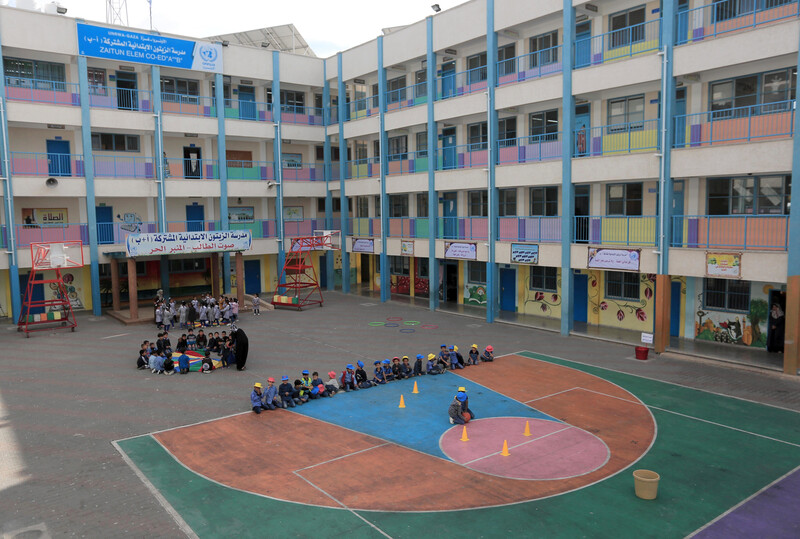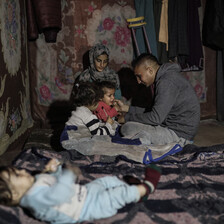The Electronic Intifada 26 August 2022

Palestinian students gather in the courtyard of an UNRWA school in Gaza City, 18 November 2019.
In 2001, when I was six, I attended my first UNRWA school, the Gaza Elementary School. The walls of the school were painted blue and white to match the logo of the UN agency for Palestine refugees. My uniform, a dress, had similar blue and white pinstripes.
Only when I got older did I realize I was a refugee, complete with a refugee registration card. My family was from a city called al-Majdal, though we now live in the al-Remal neighborhood of Gaza.
In 2017, I was part of a youth leadership program and we traveled to the West Bank to meet other youth leaders. After we passed through the Erez checkpoint, the first major city we came across was al-Majdal.
I couldn’t see a lot of the city from my window, but I already knew so much about the place from my dad’s descriptions. Sitting on the bus, I sensed that I belonged there, in al-Majdal.
But the city disappeared as quickly as it came into view. We were not allowed to get off the bus, ostensibly for security reasons.
More than ever I felt like a refugee.
Throughout the Gaza Strip, there are eight Palestine refugee camps, full of refugees like me, all from different generations and with different memories of when they first realized they were refugees.
Here are some of their stories.
Fayqa al-Sous
Fayqa al-Sous was born in al-Bureij Camp in 1956. She is 66 years old. Her family comes from the village of Beit Tima, located about 20 miles from Gaza City, in occupied Palestine. She was a teacher at UNRWA schools.
“I have been living in this camp since birth. I am a refugee and I dream of going back to my homeland. Every corner of this camp reminds me of the bittersweet memories of my grandparents’ life before the Nakba [the forcible expulsion of Palestinians from their homeland].
“My grandmother was called Miriam. At that time, she was in her late thirties. The second day after the Nakba, she cried so much after what happened and decided to go back to her house in Beit Tima despite how risky and dangerous the way was.
“She rode the donkey for 10 kilometers [about 6 miles]. She took a metal box with her. Longing to return home, she contemplated the village. Then, [when she arrived at her village], she retrieved the documents that proved ownership of the house and other lands and locked them in that metal box. Her husband owned 400 acres in the village. She believed that these documents were proof that they are the real owners of the land.
“She was in a hurry and made sure she left before sunset, so she wouldn’t be caught by soldiers. My grandmother believed it was only a matter of time [before they could return home]. What she didn’t know is that it is taking longer than she thought. Years have passed and we still live in the camp.
“After being displaced, the International Committee of the Red Cross set up tents for us as shelters. That’s why the places where refugees gathered were called camps. On 8 December 1949, UNRWA was founded to help Palestine refugees and to improve their living conditions. They built brick houses for us instead of the tents.
“Our life was really difficult. There were only two toilets in the whole camp. One for men and the other for women. We used to stand in queues to use them. As for the houses, they were very close to each other and there was almost no privacy in them.
“As young students, we were provided with fish oil capsules and milk to drink to keep our bodies healthy. One day, an UNRWA bus came to our school loaded with these capsules. We stood in queues. I remember hiding from my teacher, trying to pretend that I took it.
“The teacher caught me and gave me the capsule. I couldn’t swallow it and I was afraid that it might break or burst in my mouth. I hated its smell. The teacher gave me a cup of water and I managed to swallow it. While I was doing so, some students got rid of their capsules and deceived the teacher.
“At that time, there was no electricity. My mom used to light a small oil lamp at night and then hang it on the brick wall so we could study while my mom embroidered. This simple lamp was made by a plumber from the camp. It gave out this heavy black smoke and then this smoke flew up to the ceiling.
“When us kids woke up the next day, we would drink water and rinse out our mouths to get rid of the smoke in our noses and throats.”
Abdul Majeed Ismail
Abdul Majeed Ismail was born in 1947. He is 75, a retired UNRWA employee, and a refugee from a village called al-Sawafir. He has spent most of his life in the Deir al-Balah refugee camp. Deir al-Balah, located on the Mediterranean coast, is the smallest refugee camp in the Gaza Strip. Here he recalls conditions in the camp between the years of 1950 and 1969.
“Palestine refugees have witnessed horrible life conditions. Words won’t do us justice if we want to explain what a refugee means. In the blink of an eye, we lost everything.
“At 7 a.m., we used to gather at UNRWA food distribution centers to get food assistance. An UNRWA employee was responsible for checking the refugees’ registration cards. Once he finished, we, the refugees, had to go to another hall that was filled with different food.
“Another employee distributed rice, lentils, flour, beans. After that, we went back home. Refugees used to spend a long time doing this. We felt really bad that we had to wait for aid because we had never needed aid in our homelands.
“Poverty was common in most families. An example of a hard job was that of the carriage driver. The cart would be filled with at least 20 bags of flour, and he would walk for 3 kilometers [almost 2 miles], starting from the UNRWA food distribution centers to the farthest spot in the camp.
“Pulling it was the hardest job because the cart’s iron wheels were worn down and it made a deafening clatter. It also required twice as much effort to pull it when its wheels were stuck in the mud, in the open sewage ducts in the camps and in the sand. This was for only a few piasters, so he could provide for his family.
“When we were in school, we used to suffer in the winter as our school bags were made of useless old pieces of cloth and our shoes were thin and worn. Lucky ones in that time were the ones who had boots that could protect them from the mud. Our clothes used to get wet, but we continued learning at school no matter how cold it got.
“There was only one center for dentists located in Khan Younis. If you were complaining about a toothache, you had to wait for the UNRWA bus to collect all patients from all camps and then go to the clinic. The only treatment was to extract damaged teeth.
“One of the happiest moments for us was the UNRWA ‘cinema,’ [a roll-down screen] which took place once a year before the Naksa in 1967 [with its occupation and expulsion]. People used to gather from all the different camps at the soccer field to watch a film outdoors [like the 1959 Egyptian film “Hassan and Naima”]. After the film ended, everyone would leave happy.
“The days I spent in the camp are unforgettable. No matter how different the camp’s identity and features are in terms of modern homes and paved streets, the young generation should be constantly reminded that they are the sons and grandsons of refugees whose lands were stolen. They should remember that the return to Palestine will inevitably be achieved.”
Hatem Obaid
Hatem Obaid was born in 1963 in Beach refugee camp. He is 59 years old and from al-Majdal. He works as a laboratory department manager at al-Naser Hospital. Hatem studied chemistry in Algeria and was given a chance to stay there and work, but he was determined to return to Beach camp.
“Life in the camp is really tough, especially in the winter. The houses were small and so close to each other. We used to sink in the mud while walking to school. Some students were barefoot. At that time [1950 to 1969], those who were lucky were the ones who had tall boots. Also, we used to heat ourselves using old wooden stoves. I remember that one day, our neighbor’s walls fell down because of a heavy rain and thunderstorm.
“The most prominent characteristic of the camp is the relationship of its children to each other. In modern societies, you find a person living in a residential tower who does not know his neighbor, unlike what you find in the camp, where family bonds and social solidarity are strong. The customs and traditions of the camp’s children are not found abroad.
“We Palestine refugees suffered a lot, but we should never give up. We have many stories to tell to the whole world. I spent most of my life in Beach camp, and I am proud of that.”
The author is a freelance writer and translator from Gaza, Palestine.





